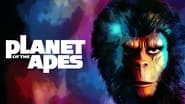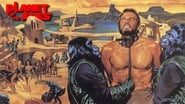George Taylor
Two enormous SF movies came out in 1968. This is the superior of the two. Planet of Apes spawned franchises, toys, model kits and basically was the blue print for the Star Wars juggernaut that came around a decade later. A brilliant movie with one of the greatest endings ever, it simply has withstood the test of time. The entire cast is as near perfect as a cast can be. This film allows one to suspend their disbelief - for instance why isn't Taylor shocked that the apes speak English? Doesn't matter. Maybe he's in shock. Who cares? What matters is that this movie works on EVERY SINGLE level. With an absolutely superb screenplay by Michael Wilson and Rod Serling (who lifts the death of Stewart from his own Twilight Zone Episode, The Solid Gold Caper) and one of the greatest shock endings (parodied often) in cinema history, this was a classic from it's first screening and it's a classic today. I never get tired of watching this. EVER.
a_chinn
Charlton Heston is part of a crew of astronauts who crash land on a planet where monkeys and apes have evolved into the dominant species and humans are the wild, mute creatures living in the wilderness. Written by Rod Serling, legendary host and creator of "The Twilight Zone," the film is fascinating science fiction that works on the surface as straightforward entertainment but also works on a subtextual level, raising questions about evolution, animal cruelty, and humanity's inclination towards war. My only complaints about the film are that the opening scenes in the desert seem to drag on for quite a while and don't serve to forward the story. Also, the films final scenes are rather slow paced and overly talky. SPOILER ALERT! Now I do love the extended scenes of Heston and Nova's surreal horseback ride along the beach before his surprise discovery ("You Maniacs! You blew it up! Ah, damn you! God damn you all to hell!"), but it's the scenes preceding this in the archaeological dig site that seemed rather slow, though I do quite enjoy Heston's lecturing of Dr. Zaius ("Doctor, would an ape make a human doll that TALKS?" - although my kids have many talking animal toys, so it's a bit of an invalid argument, though no one can argue the point if Charlton Heston is shouting it at you.). Despite occasional pacing issues, Serling and director Franklin J. Schaffner ("Patton" "Papillon") create a world that becomes increasingly rich and fascinating as the film goes on. An imperfect film, but an undeniable classic, as well as a significant pop culture touchstone.
Sparse
Sometimes there's so much to say about a film that only blanks can be drawn in the unrelenting breathlessness of racing thoughts. Simultaneously entertaining and intellectually enthralling, this film bleeds unforgiving satire with every frame. Planet of the Apes is a cinematic landmark, and it obsesses my entirety.I'm having to choose my words here with great care. There's so much to write about, and organizing my thoughts to do this movie justice is a challenging task for me. Planet of the Apes has shaped who I am more so than any other film I've seen, and while I can't promise the same profundity of experience to every viewer, the allegorical implications contained within this text persist with potency. Science fiction is arguably the genre best equipped to reflect upon humanity, and this feature harnesses this medium masterfully. This is also by far the most allegorically dense film I've ever encountered: unveiling ruthless commentary on race, religion, philosophy, and politics, in often blunt but always meaningful fashion. Though sure to challenge some audiences in ways that might upset them, I find the content of this film to be of great importance.It may on occasion be cited as the original summer blockbuster, but more importantly, this film is intellectually enthralling. By reflecting humanity through a society of apes, we're similar enough, yet simultaneously given enough distance to internalize the film's intricately woven analogies. That being said, strong direction by Franklin J. Schaffner ensures a solidly entertaining experience, with exciting action sequences and and some appealing cinematography. Seeing as how this film is strongest in its intellect however, one should really look to its writing.Though it's been some time since I've read Pierre Boulle's "La planète des singes" (a.k.a. Monkey Planet), I have to give it credit for providing such a rich foundation for this monumental production. The film however, takes the concept even further. If this movie ever felt like a really good, feature-length episode of The Twilight Zone, that's because it basically is--the initial draft that eventually became the film was written by Rod Serling himself, hence the defining twist at the end. The politically charged final product however was by none other than Michael Wilson (The Bridge on the River Kwai, Lawrence in Arabia).A degree of Planet of the Apes' politicality can be attributed to some of Wilson's background. During the McCarthyism scare, a number of Hollywood screenwriters were accused of being "communists" and were blacklisted from the industry. Wilson was forced to flee to France, and proceeded (as many others did) to write under a separate alias or go wholly uncredited. Upon release, all screen credit for Planet of the Apes went to Pierre Boulle, and Wilson finally received writing credit for his work post- mortem in 1984. Though tragic, it implies that his experience with being wronged by a political system in-part provided a drive for creating this brutally satiric screenplay. Col. George Taylor is worthy of a more in-depth character analysis, as a study on existentialism, and an experiment on the ego. Consider that this "upside down world" is intentionally perceived by a white male, now stripped of his rights and part of a silenced minority. The social structure of the apes actually provides some stunning race/class commentary, with the darkest of gorillas confined to menial working-class roles whilst the lightest of orangutans held societal power, often in the form of political or religious leadership. This is used to reflect the dangers oligarchical and theocratic societies. This class structure also outlines an overall political dichotomy, revealing its relationship with class, race, and how it affects our ability to perceive. There is also depiction of bigotry, religion, and the war on science, most notably the trial scene that reflects the Scopes Monkey Trial. By repeating fallacious arguments through the medium of non-human characters, the audience is given perspective and may unwittingly realize their own, human flaws.Charlton Heston deviates slightly from his dignified, heroic typecast, now favoring a character stripped of some of their dignity, but is otherwise just playing himself: Charlton Heston. Kim Hunter as Zira and Roddy McDowall as Cornelius are endearing, and Maurice Evans is unsettling and commanding as Dr. Zaius. What's impressive about the actors who portrayed the apes is that they had to develop acting methods that would bleed through the prosthetics, and they succeed impressively well, exhibiting their spectacular but often under-appreciated talent.The prosthetic ape makeup by John Chambers is simply revolutionary. The apes in this feature are completely believable evolved counterparts to the great apes we see today, and it was no easy feat. The makeup took four months for Chambers to develop, and then several more hours to apply everyday before filming. The work on this level actually broke records and set a new standard for ape costumes in movies, mirroring the reboot franchise's later breakthroughs in motion capture technology. Planet of the Apes is an innovative franchise at its core, and will likely continue to innovate until the apes take over.The score by Jerry Goldsmith is avant-garde and enthrallingly bizarre. Though not crafted with the same kind of narrative intelligence that the best film music has to offer, it goes above and beyond when creating textures that are innovative, diverse, and contribute to a memorable and unique atmosphere. Goldsmith's work here is among the best the franchise has to offer.Above all this film is a study on perspective, and can say more about humans using apes than most films can say by using humans. Planet of the Apes is as meaty as sci- fi comes, and is quintessential viewing for sci-fi fans. It's also pretty damn quotable. Score: 10/10
zkonedog
Whenever I watch the original "Planet of the Apes" movie (and I've done so at least 5 times), I am struck by how it truly personifies the genre of science fiction.For a basic plot summary, the movie focuses on a group of American space explorers led by Taylor (Charlton Heston) who have been floating around the galaxy for thousands of years. When they crash land on a strange planet, however, they find out that the evolutionary system is backwards...with apes evolving from men!The hallmark of this movie is that it can be so serious within its ridiculous parameters. I mean, I think that even most die-hard "Apes" fans will admit that the presentation of the different types of simians in this film is utterly hilarious (from the walks all the way down to the facial expressions). If you are a person with no imagination, you would be rolling in the aisles, so to speak.As such, the fact that this movie contains such pertinent political/social satiric themes with such a crazy "Apes" backdrop is truly the epitome of science fiction. Some people like their film drama in real-life, some like the Old West, and others like fantasy or cartoon worlds (along with countless other genres). If you prefer your drama to be of the thinking variety and with shades of science built in, than this is the movie for you.I also won't ruin the ending for the one guy living under a rock who hasn't already heard (!), but suffice it to say that the ending provides the perfect explanation on such a social-satire type of film.Thus, I consider "Planet of the Apes" to be one of my favorite films of all-time. It takes some imagination to enjoy, for sure, but if you can open your mind to a little craziness you'll be prone to understanding the film's simple, yet bitingly accurate, social themes.










